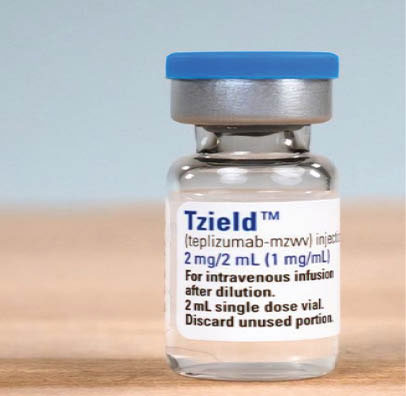The intravenous drug, teplizumab-mzwv (Tzield), is for adults and children 8 years and older who are at high risk for type 1 diabetes but haven’t yet been diagnosed with the condition and have not yet be-come reliant on insulin shots. Tzield is in a new family of medicines that slow the immune system’s attack on insulin-producing cells in the pancreas, which is the underlying cause of type 1 diabetes.
“Today’s approval of a first-in-class therapy adds an important new treatment option for certain at-risk patients,” said John Sharretts, MD, the director of the Division of Diabetes, Lipid Disorders, and Obesity in the FDA’s Center for Drug Evaluation and Research, in a statement. “The drug’s potential to delay clinical diagnosis of type 1 diabetes may pro-vide patients with months to years without the bur-dens of disease.”
In type 1 diabetes, the pancreas stops making enough insulin, a hormone responsible for helping the body convert sugars in the foods we eat into energy. Without insulin, sugars accumulate in the bloodstream, a condition that without treatment can lead to serious complications like heart disease, kidney failure, amputations, and blindness. People with type 1 diabetes need lifelong treatment with insulin shots or an insulin pump.
According to the American Diabetes Association, most people who develop type 1 diabetes inherit risk factors from both parents. People with a parent or sibling with type 1 diabetes can have blood tests to see if their body is starting to attack insulin-producing cells in the pancreas. Once these attacks are underway, people almost always go on to develop type 1 diabetes and require insulin shots, but the pace of this progression varies.
Tzield can slow the progression in people who have what’s known as stage 2 disease. According to Emory University, this isn’t yet full-blown type 1 diabetes requiring treatment with insulin, but people with stage 2 disease do have damaged insulin-producing cells in the pancreas and abnormal blood sugar levels.
The FDA approved Tzield on the basis of a clinical trial with 76 patients who had stage 2 disease. In this trial, scientists randomly assigned participants to receive daily infusions of Tzield or a placebo for 14 days.
After a median follow-up period of 51 months, 45 percent of the patients in the Tzield group developed type 1 diabetes, compared with 72 percent with the placebo.
The average progression time to type 1 diabetes was also twice as long with Tzield — 50 months com-pared with 25 months in the placebo group.










